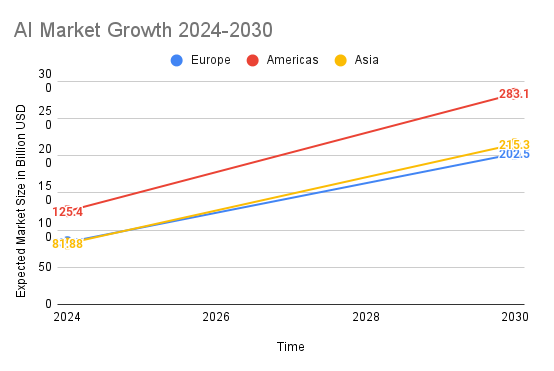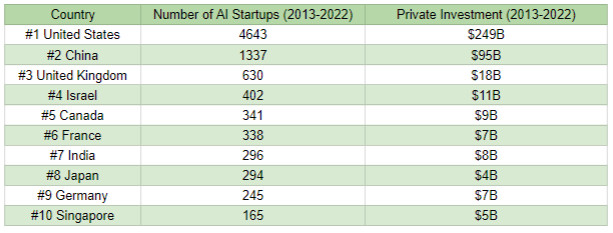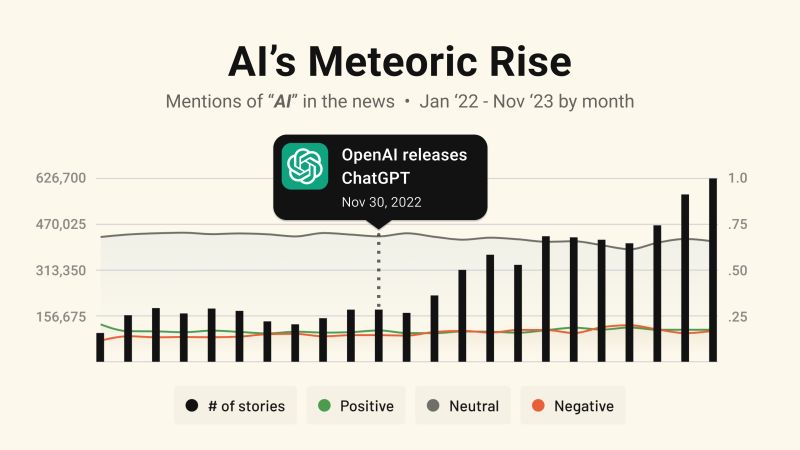
The Americas, due to their heterogeneous nature, do not present a united front as a continent when it comes to the implementation of AI.
North America, well-known for its outstanding reputation in regard to high-tech, has seized the opportunities Artificial Intelligence has presented and established its standing in the rapidly growing market.
By launching initiatives to facilitate e.g. international cooperation focusing on AI, the US has taken a clear step forward in implementing AI globally and nationally.
Just in 2019 and 2020, there have been 486 Mentions of AI in congress, explaining the leading role the US has ended up taking on in this space.
Since then, American investment has transformed and accelerated the use of AI, helping to advance everyday life for many.
However, the American public is concerned about the effects this might have on their jobs and personal lives. The majority of interviewed American people have therefore come to the conclusion that they are more concerned than excited about AI.
To counteract this development, the department of state has made it its mission to implement trustworthy AI with the OECD AI Policy Observatory platform, established in 2020, facilitating policy analysis.
Overall, the US is committed to promoting and developing a responsible use of AI, willing to collaborate with other countries and joining international programs on that matter.
Latin America, on the other hand, has not yet joined the North in that aspect. Due to regional disparities within the continent, there is no cohesive regional strategy, slowing down the development and spread of AI.
In Latin America, at the moment, there are many challenges to overcome before being able to implement AI on a large scale, which is why it is not yet as advanced as in the US.

Just as the US, Europe has also placed an emphasis on promoting AI and accelerating its development.
The corresponding numerical goal is a yearly AI investment volume of 20 billion euro, including both private and governmental investment. With this strategy, Europe hopes to further establish itself in the AI space and to eventually catch up to the US.
Since 2018, many initiatives to support the development of European Artificial Intelligence have been launched. These included policy changes, financing projects, and, since January 2024, an initiative to support startups in the AI space.
The problem that Europe is currently facing is that the dependence on clear and precise guidelines is significantly slowing down the process.
Since it is no news that the countries in Europe have different standings on many topics, it does not come as a surprise that these differences make it extremely challenging to comply with a similar set of guidelines.
This similar set of guidelines has been summarized under the EU AI Act, a comprehensive approach to trustworthy AI initiated by the European Union to promote responsible use.
With the finalization of said act approaching, Europe might be close to overcoming this organizational challenge, supporting its standing in the AI space.

Asia on the other hand can be called the AI Pioneers. With its flexible structure and incredible adaptivity, Asia has managed to drive significant developments in the AI market.
Even though the market is not as large as in the US yet, Asian growth rates have been extremely high, making APAC the fastest growing AI market in the world.
Especially, China’s explosive development promises future changes in market power, since the country is expected to outperform the US by 2025.
In addition, especially in contrast to the American people, Asians have a significantly more positive and enthusiastic outlook on the future of AI. This significantly facilitates the implementation of AI in Asia, empowering innovation and accelerating the speed at which AI can be implemented.
All this makes it possible for Asia to excel in AI, however, especially from an international perspective, there are serious concerns voiced regarding data security and the protection of intellectual property rights. This weakens Asia’s international standing, since in general, European and American companies on average don’t encounter a similar level of mistrust as Asian companies do. Therefore, regaining trust and raising data safety standards is a crucial challenge for Asia to overcome in the near future.

As can be seen in the graph above, America has established itself as a leader, further advancing its lead. With an expected market value of 125.4 billion USD in 2024 and a growth rate of 14.54%, the nations’ AI market is expected to value at 283.1 billion USD in 2030.
The AI market in Europe and Asia at the moment is relatively similar in size, being expected to lie at 83.67 billion USD vs. 81.88 billion USD in 2024, but is expected to develop differently. Due to Asia’s growth rate of 17.48% compared to Europe’s 15.87%, Europe is expected to lose the small advantage in market value it still has over Asia. According to calculations made, whilst the European Market for AI will be valued at 202.5 billion USD in 2030, Asia is expected to reach 215.3 billion USD in market value.
This shows that, despite the potential and overall significant growth within the market, there still are relevant regional differences.
Where Is AI Mostly Developed?
Americas (North + Latin America)
The USA is the world leader in AI development. There, 4643 AI start-ups were founded with private investment amounting to USD 249 billion between 2013 and 2022. Moreover, Canada ranks fifth in the world with 341 AI start-ups and private investment of USD 9 billion. Besides the US being the world leader, the Americas are not as developed in AI as other regions considering only 2 of the 20 leading AI research countries were from the Americas (2023).
Europe
Three European countries are among the top 10, with the United Kingdom considered the AI startup center of Europe, as 630 AI startups with private investment of USD 18 billion were founded between 2013 and 2022 (3rd place worldwide). France is home to 338 AI startups with private investment of USD 7 billion and ranks 6th worldwide. Finally, Germany also ranks in the top 10 with 245 AI startups and USD 7 billion in private investment (9th worldwide). It should be noted that 11 of the top 20 AI research countries are from Europe (2023), which shows the potential and ability to utilize this technology in many different countries.
Asia
Asia is a region with widespread AI skills and an enormous growth rate. In China alone, there are 1337 AI startups with USD 95 billion in private investment (2nd place worldwide). In addition, there are 296 AI start-ups in India with private investment of USD 8 billion (7th place worldwide) and 294 AI start-ups in Japan with private investment of USD 4 billion (8th place worldwide). Finally, Singapore ranks 10th worldwide and is home to 165 AI startups with USD 5 billion in private investment. The countries mentioned are also the 4 Asian countries that are among the 20 leading AI research countries (2023).

In Which Sectors Is AI Mostly Applied? Where Are Business Opportunities?
Almost every (large) company uses AI in its daily operations, even if you wouldn’t expect it sometimes. Here is a selection of industries that use AI in their daily operations:
- Healthcare
- Logistics and transportation (supply chain management)
- Automotive
- High tech
- Communication
- Retail
- Financial Product/service design
- Risk management and corporate finance
- Data-driven business analytics
Americas (North + Latin America)
As mentioned, the USA and Canada are innovative countries in terms of technology and AI. In contrast, no country in Latin America appears in the rankings about AI research or startups because Latin America is not as advanced as North America. Latin America has to catch up with the other regions where AI is already developed and used regularly. Thus, there is a need for (local) AI solution providers and related businesses.
Europe
The UK, France and Germany are among the top 10 AI startup countries in the world, but there is much more potential in Europe. Switzerland and Denmark, for example, rank high in the top 20 for AI research among other European countries. Europe has the problem that AI research and development is decentralized. Decentralization is usually a good thing, but Europe will not be able to compete with the US or China unless it pools its resources and sets up joint ventures. So, the opportunity is to unite innovative people from all European countries and become a competitor for the Americas and Asia.
Asia
China is the world’s number 2 in the field of AI, followed by India, Japan and Singapore. In addition, South Korea is an up-and-coming country with extensive research resources and is likely to enter the top 10 in the near future. One challenge for Asian AI companies is to expand their business activities to other regions outside Asia. Cooperation with other (European) companies could therefore be helpful in order to open up new markets. This can be an opportunity for Europeans to already develop AI or work in related industries and know the market.

Cross Border Cooperation
Crossborder cooperations will gain relevance as the development of AI continues to progress. The FCAI, the Forum for Cooperation on Artificial Intelligence, consisting of seven global governments, is investigating the opportunities of international cooperations and sees relevant benefits of it in the future.
The US and the EU in particular are very interested in cooperating, as they made clear during the Trade and Technology Council 2023. Their joint goal is to seize opportunities using their respectives strengths and identifying risks as early as possible.
Moreover, according to the vice president of the EU-Commission, the EU is interested in partnering with countries that operate by similar values, explaining why they have joined forces with each other and not other countries.
This also means that it is not so easy for the EU to collaborate with Asia, mainly for the aforementioned concerns.
Nevertheless, both sides are eager to resolve that issue and significant progress has been made, as, for example, projects like AECAIR were launched. The International Conference on Global Governance of Artificial Intelligence focuses on how Europe and China can work together and learn from each other when it comes to AI.
But the US are not falling behind when it comes to international cooperation. Singapore, for instance, has become a partner of the US when it comes to emerging technologies. Both countries are committed to strengthening their partnership and collaborating on relevant technical matters such as AI.

Stand-out Acquisitions Of Small By Big Companies
As the popularity of AI increases, so does the number of acquisitions. Big tech companies in particular have recently acquired many smaller AI start-ups and implemented their solutions. Below find examples of recent acquisitions:
- Microsoft (USA) acquired Open AI (USA) in 2023 for USD 10 billion
- Microsoft (USA) acquired GitHub (USA) in 2018 for USD 7.5 billion
- Meta (USA) acquired Scape Technologies (UK) in 2020 for USD 40 million
- Apple (USA) acquired Xnor.ai (USA) in 2020 for USD 200 million
- Transcarent (USA) acquired 98point6 (USA) in 2023 for USD 100 million
- BioNTech (GER) acquired InstaDeep (UK) in 2023 for EUR 410 million
- Olympus (Japan) acquired Odin Vision (UK) in 2022 for USD 80 million
- Walker & Dunlop (USA) acquired GeoPhy (Dutch, AI for Valuation Real Estate) in 2022 for USD 85 million
The chart below shows the number of AI acquisitions by US big tech companies. It can be observed that the numbers are increasing as AI is a crucial business sector and will be a key success factor in the coming years. Among the big tech companies, Apple is by far the most active in terms of AI acquisitions, followed by Google, Meta and Microsoft, while Amazon ranks fifth. However, quantitative figures do not say much, but they do show the importance of AI.

AI used in International Business
But also in international trade, AI will bring significant changes to daily operations.
For example, in supply chain management, AI can help forecast demand, political conflict, natural disaster and much more. With AI, it becomes possible to obtain a more tangible estimate of the effects certain events can have on the given supply chain.
In reality, this would mean that the risk of e.g. natural disasters disrupting an operation can be minimized, since corporations would be able to better predict such events and adjust their strategies accordingly.
Moreover, since Artificial Intelligence can analyse vast amounts of data, it is able to identify emerging market trends, consumer preferences and competitive landscapes. By being able to interpret and compare data, it can help companies to prepare for future shifts in the market and get them a serious advantage over competitors which are only catching up with trends as they occur. Gaining a better understanding of consumer preferences is also likely to lead to improved marketing and more fit sales strategies.
Furthermore, it can generate and target high profile leads based on previous successes. By analyzing which kinds of leads have been closed in the past, AI can make suggestions on who to contact in the future.
These data-driven analytics are why AI plays an increasingly important role in managing risk and ensuring compliance with import and export regulations.
Therefore, as can be seen by the endless amount of opportunities, AI does have the potential to revolutionize international sales and could speed up analytic processes in the future.
However, at least for the coming years, AI will only play a supporting role in International Business for companies, since human interaction and international communicative competence are still determining interpersonal soft skills when it comes to increasing international sales and expanding internationally.
Are you interested in hearing more?
Click here for the latest BNR Wereldspelers Episode, which uncovers Joris Castermans’ path to a more inclusive future with Whispp:
Related
Trending Blog

Doing Business in Spain: Patience is a Virtue
Spain, the fourth-largest economy in Europe, presents tremendous opportunities for Dutch entrepreneurs looking to expand their businesses. However, patience is the key to success in this fascinating market!




